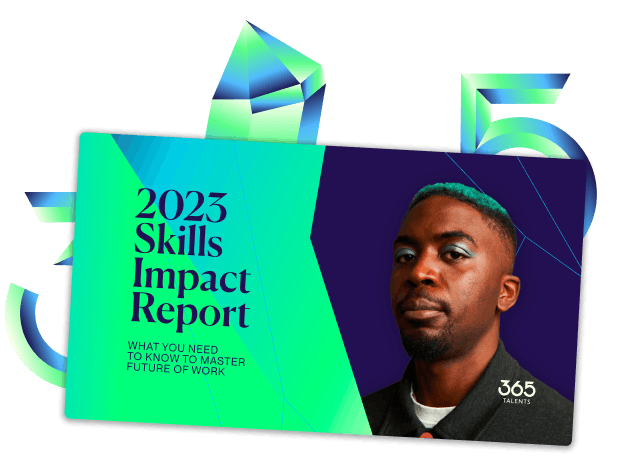What are the skills of tomorrow?

Have you heard the statistic “85% of the jobs that will exist in 2030 haven't been invented yet”? Of course you have! You have probably heard it 100 times or more.
Since it was first cited in a 2018 Dell Technologies report, the statistic has served as a much-loved conversation starter in workplace settings, and given business leaders substantial cause for concern. But instead of letting panic take hold, it’s important that employers interrogate what this statistic truly means. It certainly won’t be necessary, for example, to replace 85% of the workforce within the next eight years.
That’s not to say that organizations shouldn’t be astutely aware of the future of work and the future of skills, because things are changing fast. The rise of automation, although happily augmenting the role of the human worker, does mean that certain skills are more quickly made obsolete, while others are all the more vital. The Future of Jobs Report, for example, projects that automation will displace around 85 million jobs by 2025. Rapidly evolving business objectives and unprecedented external disruptions also preclude the hiring of workforces with highly specialized, technical skill sets.
Ultimately, it’s not effective or efficient to replace large portions of the workforce every time a technology revolution or black swan event occurs. Far better to recruit top talent and upskill existing employees with a range of transferable skills that will stand the test of time.
Below, we provide a run-down of the top 10 skills of tomorrow and offer some tips on how to hire future-proof talent.
Top 10 skills of the future
1. Emotional Intelligence
If there’s one skill that cannot be replaced by automation and artificial intelligence (AI) it’s emotional intelligence (EQ), something that remains a uniquely human capability.
EQ describes someone’s ability to express, regulate, and control emotions. An emotionally intelligent person will be aware of how emotions can influence an individual’s behaviors and impact others around them.
Employees with high EQ will be more perceptive of the feelings of those around them, better at building long-lasting and meaningful relationships with co-workers and clients, and adept at promoting positivity and inclusivity in the workplace.
In today’s fast-paced and unpredictable working environment, it’s especially important that our future leaders display compassion and empathy.
2. Coding
While demand for some technical skills is on the decline, coding remains a critical skill across almost every industry. This is highly unlikely to change any time soon, given that computers are certain to dominate our future.
A recent FastCompany article noted that one-third of the top 25 jobs on Glassdoor were coding or IT related, further asserting that coding is the most important job skill of the future.
Organizations need coders who can solve problems, understand technology, and advance their business goals. In addition, coders are typically excellent communicators, mathematicians, and writers, with superior concentration skills.
According to Stack Overflow’s 2020 Developer Survey, the most in-demand coding languages are JavaScript, HTML, SQL, Python, and Java.
3. Communication
As many as 86% of employees and executives cite the lack of effective collaboration and communication as the main cause of workplace failures.
Good communicators are assertive, thoughtful, and patient. They can tell a story well and are excellent active listeners. Important skills for employees who must engage with a variety of internal stakeholders, as well as external clients and customers.
Your organization’s best communicators are the ones closing important deals, effectively dealing with conflict, and building valuable networks.
4. Digital literacy
Employers need employees who can comfortably and confidently navigate the digital world and willingly adapt to new technologies and processes.
Most crucially, workers with good digital literacy won’t be resistant to your organization's digital transformation efforts. Rather, they’ll be excited to discover how newly implemented tools and technologies can enhance their role.
According to Forbes, 84% of digital transformations fail, which is largely due to a lack of employee buy-in. By hiring more digitally literate people, you will increase your chances of success.
5. Critical thinking
More than half of the world is active on social media and users spend an average of 2 hours 29 minutes per day browsing sites like Instagram, Facebook, and Twitter.
With an overload of information (and a lot of fake news) to contend with, your organization needs people who can think critically and objectively - considering facts, figures, and evidence before hearsay, personal opinions, and anecdotes.
6. Creativity
The World Economic Forum listed creativity as one of the top three skills workers will need beyond 2020 while LinkedIn Learning rates it as the most important skill in the world.
Creative employees are capable of finding unique and innovative solutions to workplace problems, challenging the status quo, and driving competitive advantage for the business.
Of course, simply hiring for creativity is not sufficient. Organizations must unleash their workers’ creativity by fostering a flexible and adaptive working environment. A Gallup study found that 35% of employees only have the opportunity to get creative a few times a year or less.


2023 Skills Impact Report
This report, which features original insights from Accenture, Axa Climate School, Credit Agricole, OpenClassrooms and OpenWeb, takes a deep dive into the impact of adopting a skills-based approach to your HR strategy and explores the myriad ways it can transform your organization and help you move quickly and purposefully toward the future.

7. Curiosity
The right hire is not always the obvious one. To determine who will add the most value to your organization, it’s often important to dig a little deeper to uncover hidden gems.
Let’s imagine you’re recruiting for a technical position. Of the final two shortlisted candidates, one has the precise skill set you require at this time as well as an additional year of work experience. The second candidate interviewed well but, at least on paper, are far less skilled. It would seem like a no-brainer to hire the former.
However, it turns out that the second candidate has a much greater thirst for knowledge. They’re determined to learn as much as they can and are always curious to try new things or implement different business processes.
That’s the person you really want on your team. The one who will grow with your business and deliver value in the long-term.
8. Leadership
Leadership skills are valuable to your business at every level of seniority, and your employees needn’t be people managers to exhibit them.
A good leader brings out the best in people by establishing a working environment in which they can thrive. The ability to do so will add value whether it’s an employee collaborating with a single peer or a CEO leading a team of hundreds.
Plus, in the process of identifying and hiring candidates with strong leadership skills, you’re setting your organization up for long-term success. The best leaders increase workplace productivity, reduce turnover rates, and improve employee well-being.
9. Adaptability
If there’s one thing we’ve learned in the past few years, it’s that adaptability in the workplace is key.
Following the outbreak of COVID-19, organizations had to contend with supply chain delays, changes in customer and client demand, reduced workforces, national lockdowns, and the very sudden shift to remote working. Navigating these challenges would never have been easy, but organizations with an adaptable workforce were best placed to weather the storm.
An adaptable employee remains motivated and focused in the face of adversity. They’ll find ways to be resourceful and pivot their contributions to suit the business’s needs at any given time. Employees who can readily adapt to geopolitical unrest, natural disasters, economic uncertainty, global pandemics, and rapid technological advancements are worth their weight in gold.
10. Decision making
In a data-driven world, decision-making is an increasingly important skill. While it might be beneficial to collect and analyze vast swathes of data, it’s what you do with it that truly matters.
Employers need people who can confidently and calmly make important decisions for the business while weighing-up any potential risks. The ability to do so can reduce business costs, drive efficiencies, and improve workplace productivity.
How to future-proof your workplace and hire for the skills of tomorrow
In recent years, there has been a major shift towards skills-based hiring, which means candidates are recruited based on their aptitude, skills, and capabilities instead of their qualifications or work experience.
Indeed, the Harvard Business Review (HBR) analyzed more than 51 million job listings and found that, between 2017 and 2019, employers reduced degree requirements for 46% of middle-skill positions and 31% of high-skill positions. Why? Because the candidate who boasts a very specific set of qualifications isn’t necessarily the best long-term investment for your business.
Skills-based recruitment, by comparison, encourages hiring organizations to focus on their long-term business goals and recruit workers with transferable skills. As well as gaining access to a much wider talent pool, this can also serve to eliminate unconscious bias throughout the hiring process.
You’ll be hiring candidates based on merit, and not because they were privileged enough to attend an elite high school or qualify for a top college. The result is a more diverse workforce, which spells good news for innovation, competitive advantage, business output, retention rates, and brand reputation.
Some skills-based hiring practices include:
- Skills assessments: Skills assessments provide an unbiased assessment of candidates’ job-relevant skills. You’ll quickly eliminate unsuitable candidates and only interview the best of the best. Skills assessments can, among other things, improve retention rates, reduce instances of unconscious bias, and address skills gaps.
- Anonymized resumes: Removing personal information (such as name, age, educational background, and qualifications) from resumes compels hiring managers and recruiters to focus on capabilities.
- Skills-focussed job descriptions: Highly prescriptive job descriptions are a barrier to entry for many candidates, who will question whether they are qualified enough to apply for a role. Think carefully about the qualification and work experience requirements you include to avoid deterring top talent.
- Job auditions: It’s difficult to know if you’ve selected a perfect candidate until you’ve seen them doing the job for real. Job auditions require applicants to immerse themselves in the role, be it for a couple of hours or an entire day. You’ll have the opportunity to observe their working style, the way they navigate challenging situations, and how they interact with other employees.
Concerning your existing workforce, it’s important to establish a culture of continuous learning and professional development. Skills assessments prove useful in this context too, since you will be able to pinpoint current and future skills gaps and identify high-potential employees. When you know which employees have the capacity to be great leaders, for example, you can invest in them to develop their core competencies.
Encourage and incentivize your employees to find time for learning, whether it’s taking part in cross-functional work, enrolling in a training course, or shadowing a senior leader.
Make time to talk formally about career development opportunities and long-term career goals. When employees feel invested in and listened to, they will be more motivated to better themselves and invest in the future of your company.
Want to learn more about how your organization can move quickly and confidently toward the future of work? Get in touch with 365Talents today.
Uncover more HR insights









